Stressed Out: Can Stress Affect Your Teeth?
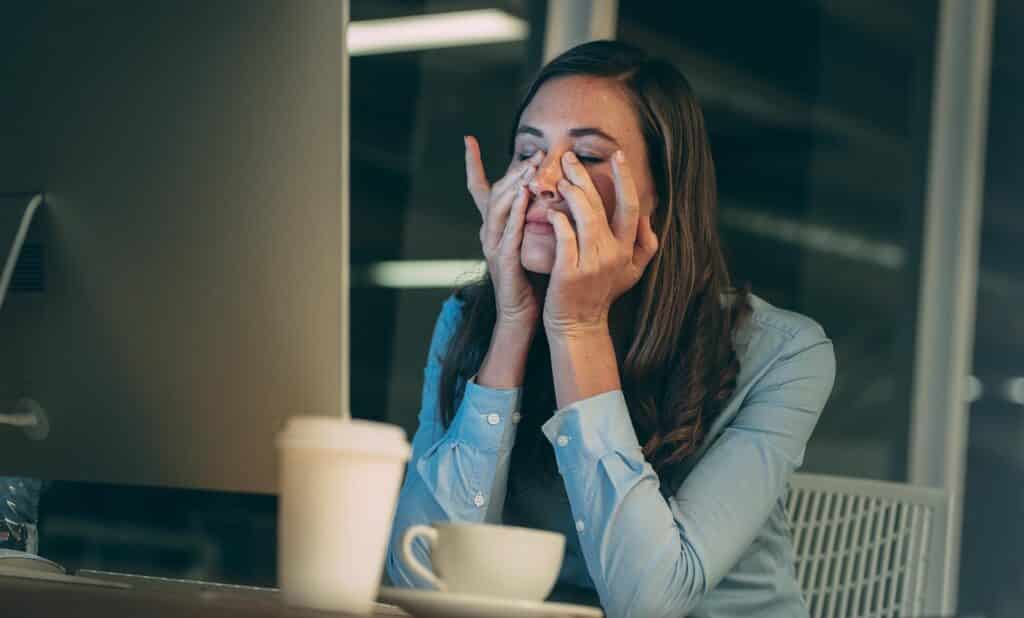
You have too much to do at work. You have to juggle a million tasks between your children, your spouse, and errands — not to mention your mother-in-law is in town for the weekend. We all have those days, and those days can add immense stress to your life. That stress affects more than just your emotional health; it physically alters you as well. Your mouth already experiences daily wear and tear that you need to prevent as much as possible. If you are too stressed, this adds another layer of factors fighting against the health of your mouth. It starts before you even realize — you are stressed out thinking about everything you need to do, and then you notice you’ve been clenching your teeth for the past few minutes. Depending on how you handle stress, you may be doing this multiple times per day, which takes a toll on your mouth. Signs of Stress Impacting Your Oral Health 1. Poor At Home Oral Hygiene When we are stressed self-care may become less important. We can start over indulging in comfort foods high in carbs, sugar, and caffeine. A poor diet and ignoring our regular oral hygiene routine can lead to plaque buildup, caries, and even tooth loss. 2. Dry Mouth Saliva keeps teeth moist, helps fight bacteria, and helps removes food particles from your teeth. But when you are trying to manage increased stress, your saliva production can be reduced. This can result in increased plaque buildup and a higher likelihood of dental problems. 3. Clenched Jaws The constant muscle tension in your jaw that can result from chronic stress can cause TMD or temporomandibular disorder. This condition causes pain in your temporomandibular joint (TMJ), your jaws, and around your ears. You may also experience difficulty opening your mouth or chewing food or even hear a clicking noise. If left untreated, bruxism can also destroy dental restorations (fillings, crowns, bridges, etc.) that you’ve had done, creating more pain and costing more money. 4. Teeth Grinding Teeth grinding or bruxism is a common symptom of stress or anxiety. This is often an unconscious action so many people are unaware of their teeth grinding, especially if they are grinding their teeth while they sleep. Grinding teeth results in significant wear and tear on your teeth. This can lead to damage to the enamel, chipped teeth, loose teeth, increased sensitivity, and pain in your temples. 5. Decreased Immune Response Stress often has a detrimental effect on your immune system. A reduced immune response makes it harder to fight off infections, and high levels of cortisol ( a hormone related to stress) lead to protein production in the gums causing inflammation and increasing the likelihood of developing gum diseases like gingivitis and periodontitis. 6. Cold Sore Blisters Cold sores are caused by the herpes simplex virus. Many people can go for months without dealing with a cold sore however increased stress is a common trigger. Cold sores typically appear on the lips or corners of the mouth, in some instances they can also appear on your gums leading to difficulty brushing and flossing. How to Prevent Teeth Grinding and Clenching Since one of the main causes of teeth grinding and clenching is stress, the best way to stop is to reduce your stress. Hold on — put down that glass of chardonnay or moonshine you have after work to unwind (alcohol increases the likelihood of teeth grinding while sleeping). Here are some stress-management techniques that will help reduce your overall stress. Exercise. Not only does this release endorphins to help combat stress, but at the end of the day, you’ll be too tired to have stress-inducing thoughts. Autogenic relaxation. This method involves “commanding” your body to relax. This takes a lot of practice but can be very effective once learned. Learn more about autogenic relaxation here. Visualization. Trying to use all five of your senses, imagine a scenario that is relaxing. For example, if you imagine yourself in a forest, listen to the sway of the branches, feel the warm light creeping between the trees, and note the scent of pine needles. Listen to your favorite music. Classical is always a reliable genre to relax to, but listen to the type of music that helps you unwind. These techniques will only work if you allow them to. When using them, ensure you have an open mind and allow yourself to relax. Everyone is different, and it will take time to find what relaxes you, as well as mastering the technique itself. The benefits of stress-management strategies will not only help your teeth-grinding issue but also provide benefits for many other health issues you may be experiencing. Other Stress Reducing Tips to Consider If you notice throughout the day that you are still clenching, stick the tip of your tongue between your teeth. This will force you to relax your jaw muscles. According to the TMJ Association, take anti-inflammatory medicine (such as ibuprofen) to help with swelling and pain until you can get your teeth grinding and TMJ/TMD under control. Check with your physician to see if you are able to take anti-inflammatory medicines. Place a warm washcloth on your jaw before you go to bed to help relax your muscles. If you try these stress-relieving techniques and are still experiencing pain related to clenching and grinding, your Palmdale, CA dentist can do an examination to determine the best course of action. In most cases, your dentist can create a mouth guard/splint to prevent clenching and grinding. Additional Dental Services May Include: Managing pain with a special diet Stretching exercises Anti-inflammatory medications For more information about stress and your dental health, request an appointment at AV Sierra Dental Center by calling 661.202.3542 today. Reference: Stress management. (n.d.). Retrieved July 12, 2016, from https://www.mayoclinic.org/healthy-lifestyle/stress-management/in-depth/relaxation-technique/art-20045368 Teeth Grinding (Bruxism): Causes and Treatments. (n.d.). Retrieved July 12, 2016, from https://www.webmd.com/oral-health/guide/teeth-grinding-bruxism TMJ Association, Ltd. (n.d.). Retrieved July 13, 2016, from https://www.tmj.org/site/page?pageId=257
E-Cigarettes and Your Oral Health: The Smokeless Threat to Your Smile
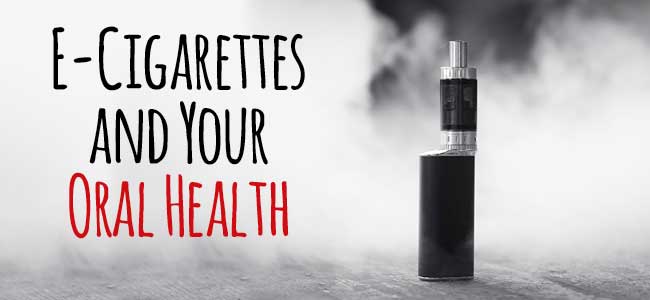
For many smokers, e-cigarettes seem like the best answer to avoiding the nasty side effects of smoking traditional cigarettes, including the odor and the staining of teeth, skin, and clothing. Though e-cigarettes still contain the highly addictive chemical nicotine, tobacco and other harmful elements are eliminated from the electronic smoking process, or what some refer to as “vaping.” The growing popularity of e-cigarettes and vaping, especially among young people, has caused a rise in concern over the lack of knowledge around the effects it has on health. While clinical studies are currently underway, in 2014 the U.S. Food and Drug Administration (FDA) released a statement saying “e-cigarettes have not been fully studied, so consumers currently don’t know the potential risks of e-cigarettes when used as intended, how much nicotine or other potentially harmful chemicals are being inhaled during use, or whether there are any benefits associated with using these products.” Vaping has a direct effect on oral health. Exposure to e-cigarette aerosol can lead to an increase of bacteria in the mouth, which is associated with gum disease, cavities, and tooth decay. The flavoring added to many e-cigarettes can also lead to cavities, not to mention an increased chance of developing chronic lung diseases. It can also cause dry mouth, inflamed gums, and other issues dentist are able to speak to how these new smoking devices threaten your oral health. Nicotine is harmful to your teeth and gums, even in the absence of tobacco and other chemicals traditionally found in cigarettes. Electronic cigarettes still deliver nicotine to their users through the mouth, throat, and lungs. The following are some of the consequences that come with using smokeless cigarettes. Gum Disease: One of the highest risks of e-cigarettes is an increased risk of gum disease coming from three specific conditions. Nicotine leads to Vasoconstriction, which is the limiting of the blood supply to the gums. When the blood supply to your gums is reduced it makes the more susceptible to infection and can lead to gum recession. Gum disease is caused by plaque bacteria. Smoking dries out your mouth, creating an environment that is more conducive for bacteria growth. Your immune system is weakened as a result of smoking, so infectious diseases can develop at a faster rate. It’s important to note that in addition to the problems caused by vasoconstriction one of the telltale signs of gum disease is swelling of the gums caused by irritation. When nicotine reduces blood flow, preventing swelling, this indication of gum disease can be masked, causing your dentist to miss the symptoms and allowing the disease to progress. Gum Recession: Lack of blood flow to the gums keeps the tissue from receiving the nutrients it needs to survive. Over time the skin dies and recedes. Bad Breath: Nicotine restricts your body’s ability to produce saliva, which makes your mouth vulnerable to harmful bacteria and tooth decay. Combined, dry mouth and bacteria lead to halitosis, which can be embarrassing and can affect your self-esteem. Intense Grinding: As a stimulant, nicotine causes muscles to tighten and spasm against the user’s will. It can cause sleep disturbances such as insomnia and grinding of the teeth. Grinding, especially while sleeping, can be damaging to teeth and result in the loss of tooth enamel, as well as chipping, cracking, and breaking of teeth. If you want to maintain your best oral health, avoiding any type of smoking is recommended. If you do choose to smoke, keeping it to the minimum and maintaining your best at-home oral hygiene practices as well as your routine visits to the dentist is important. If you see signs of periodontal disease (including red, swollen, bleeding, or receding gums) or experience bad breath, painful chewing, or loose teeth, make sure to contact your dentist immediately. There are treatments you can receive that will help keep your teeth and gums in the best possible condition. Two such treatments include: Professional dental cleanings Plaque and tartar are removed from above and below the gumline. If you have gingivitis or signs of periodontitis, you will be required to have this level of cleaning twice a year or more. Scaling and root planing Plaque and tartar are scraped away from both above and below the gumline while under local anesthetic (scaling). Rough spots on the tooth root are then smoothed out (planing). Locally applied medications, such as antimicrobials and antibiotics, may be used. If you are experiencing jaw tightness or pain, and you think you might be grinding your teeth, your provider can fit you with a mouthguard that will protect your teeth while you sleep. It can be difficult to share your habits with your dentist. At AV Sierra Dental Center, we treat our patients with respect and compassion. We are here to help you be your healthiest self. If you use e-cigarettes and are concerned about how they may be affecting your oral health, call us today and set up a consultation. We will help you protect your teeth and maintain your natural smile.
A Brief History of Grills
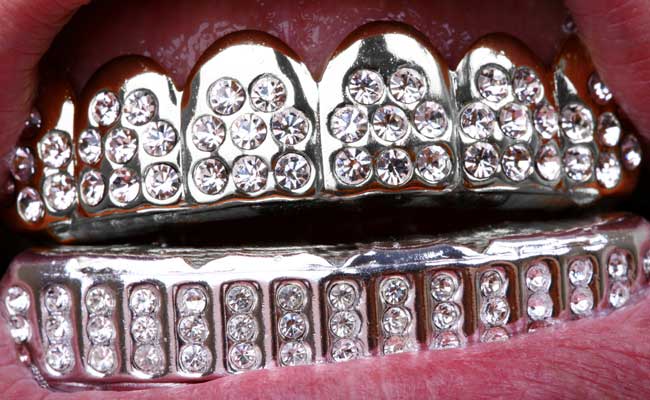
A Brief History of “Grills” Grills (or grillz) are, if not popular, at least fairly recognizable these days. Made of precious metals (gold and platinum being the most common) and often studded with diamonds, most grills are removable and worn over the front teeth. But where do they come from? Although many people would point to Nelly and his 2005 song, “Grillz,” as the starting point for the trend, they’re actually much older than that. (And no, we’re not just talking about rappers like Slick Rick, Flavor Flav, and Big Daddy Kane from the 80s and 90s, either). We’re talking ancient history. In ancient Italy, between 800 and 200 BC, wealthy Etruscan women wore teeth woven together with gold wire the thickness of a rubber band. The wire held together teeth that had been removed and were placed back into the mouth, so they made eating difficult. The practice wasn’t necessarily common, but archaeologists found documentation of around 20 sets of teeth woven together in this way. Etruscan civilization vanished as the Romans took over Italy, and this fashion trend died with it. In Latin America, Mayans actually cut small holes into their teeth and filled them with precious stones, typically jade. Again, this was a trend that only royalty and the wealthy could afford. Although the Mayan civilization has disappeared, many people in southeastern Mexico, Belize, Honduras, and Guatemala still wear gold tooth jewelry today. In ancient Filipino myths, the creator of the world, a deity named Melu, had gold teeth—and during what was the Middle Ages in Europe, Filipinos were filing down their teeth and decorating them with gold. Some of these decorations included gold bands that covered the entire front row of teeth; the oldest date to around 1300 AD. As the Renaissance began in Europe, dentistry was becoming more scientific and less superstitious—and Giovanni de Arcoli, a 15th century Italian professor of medicine, became the first author known to recommend filling cavities with gold to preserve them. Grills started appearing in rap and hip hop videos in the 80s, and became even more popular as Southern rap began to take off in the 90s and early 2000s. And now, they’ve jumped into mainstream culture, as celebrities like Madonna, Miley Cyrus, Katy Perry, and even Ryan Lochte have sported them in recent years. You might expect a dentist to come out against grillz as a health hazard, but no studies have proven that they’re bad for your teeth. As long as they’re removed and the teeth are brushed and flossed as appropriate, they shouldn’t cause health problems. Some metals can cause irritation; if it causes a rash, or bleeding, or other problems, just stop. Similarly, don’t clean them with anything toxic to ingest (like most jewelry cleaners), and don’t try to attach them permanently to your teeth with glue. But if you want to wear a grill, and you use some common sense and take care of your teeth, you’ll be part of a long tradition of dental jewelry. We can’t recommend a jeweler to create your grill, but if you have any questions about dental instruments—either ornamental or for health reasons—please give us a call at 661.202.3542 and we’ll be happy to answer your questions.
Four Foods That Can Damage Your Teeth
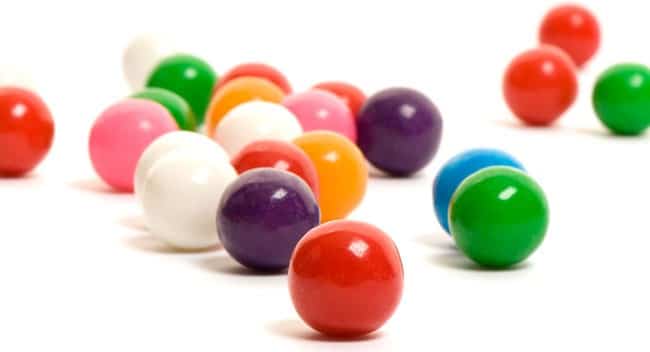
Last month, we looked at foods and drinks that can stain your teeth, but whiteness isn’t the only measure of healthy teeth. There are lots of foods that can chip your teeth or damage dental work in your mouth when you eat them. What are some of these problem foods? Your [LOCATION] dentist can warn you about some of the biggest culprits when it comes to chipped teeth, loose fillings, and broken crowns. Ice On a hot summer day, it’s great to fill a tall glass with ice and pour in some soda, lemonade, or tea to help cool down. You’re right if you assume that sugary drinks are bad for your teeth (they are!), but they’re bad in an over-the-long-term kind of way. In fact, lemonade and soda are also quite acidic, which isn’t good for your tooth enamel, either. However, it’s the ice that can actually chip your teeth if you chew it. Other hard foods can damage your teeth, too, so be careful when you’re eating things like baguettes, hard pretzels, and biscotti. Popcorn Lots of people enjoy buttered popcorn while sitting in a cool, air-conditioned movie theater, but unpopped kernels can definitely ruin the fun. They’re hard enough to chip a tooth if you crunch down on one of them by accident or on purpose. However, popcorn actually poses a double threat. The thin shell that covers the kernel can actually get stuck between your teeth or between your tooth and gum, giving bacteria a source of food and promoting tooth decay. Fruits with pits What do olives, cherries, dates, and peaches all have in common? They all have pits, of course, and those pits can damage teeth. If you accidentally bite into a pit, you can definitely crack or loosen a crown—or damage regular tooth enamel. Candy Pretty much every type of candy can damage your teeth. Hard candies can chip teeth if you bite on them or chew them up; if you suck on them and let them dissolve slowly, you’re basically giving your teeth (and the bacteria in your mouth) a sugar bath. Chewy candies, like caramels or taffy, can stick to your teeth, increasing the risk of cavities, or stick to fillings and crowns, loosening them. But sour candies are probably the most damaging of all because they combine three dangers to your teeth all in one. They’re loaded with sugar and they stick to your teeth, but the sour flavor actually comes from acids, which eat away at tooth enamel. You’re probably noticing a theme by now. Hard foods can damage your teeth. We’re not trying to you away from enjoying the sorts of treats you love. However, if you’re eating something that could chip your teeth, pay attention while you’re eating it. If you’re eating something that could damage your teeth in another way, remember to drink some water to rinse out sugars and acids. And always brush your teeth and floss after you’ve eaten any of the foods on this list. If you’ve damaged a tooth or lost a filling because of something you ate, give your Palmdale dentist a call at 661.202.3542 to make an emergency appointment. Come on in, and we can get your damaged tooth fixed right away!
Dental Travel Tips
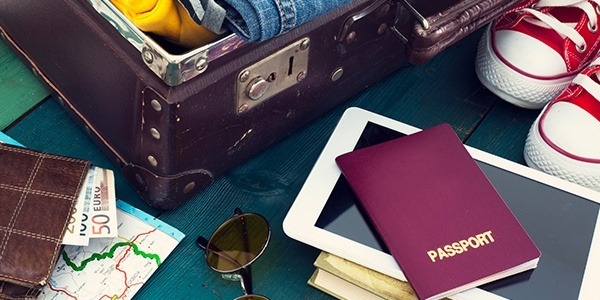
Summer’s approaching fast, and with it comes road trips, family vacations, and travel plans. We’re all for travel and vacations, but just because you’re going on vacation doesn’t mean you can take a break from oral hygiene. We’re not saying you have to pack an electric toothbrush or a Waterpik® if you’re going camping for the weekend, but you should make an appropriate plan to continue caring for your teeth and gums… or else you could end up with an unpleasant souvenir from your trip: a cavity. Make it easy for yourself with travel supplies. Packing for a trip, whether a road trip or an overseas flight, is always a pain. You never have enough room for everything you want to bring, or you forget something you definitely need (like a toothbrush). Prepare ahead by having a small case or bag with all the travel necessities—toothbrush, toothpaste, floss or picks, and mouth rinse, for starters. Travel sizes aren’t the most economical way to purchase supplies, but they are convenient and ensure you can breeze through security checks at the airport. [spacer size=”20″] Ditch the toothbrush case. Sure, it might not feel good to think about your toothbrush jostling up against shampoo, soap, deodorant, and all the other items you’ve got in your toiletries bag… but it’s not as bad as sealing a wet toothbrush inside a plastic case that doubles as a bacteria breeding ground. You can always wash your toothbrush with hot water when you get where you’re going. [spacer size=”20″] Carry on your supplies. A quick brush, floss, and rinse can do wonders to help you feel refreshed on a long flight or when you get to the airport—and going carry-on will save you headaches if your luggage is delayed. But don’t obsess about it. You’ll be able to get new replacements at a drugstore almost anywhere you go. [spacer size=”20″] Stick to your routine. When traveling, it’s all too easy to get caught up in sightseeing, hiking, and dining out. In fact, that may be the entire point of some vacations. But oral hygiene is one of those things where the routine matters. Remember to brush at night before bed, in the morning after waking up, and to floss at least once a day. [spacer size=”20″] If in doubt, use bottled water. In foreign countries, especially ones that are off the beaten path, play it safe by using bottled water for your oral hygiene routine. As a rule of thumb, if you’re going to avoid drinking tap water, then avoid using it for brushing. Thankfully, in these places, most hotels will provide a complimentary bottle or two every day. [spacer size=”20″] Stick with healthy snacks. When you’re on the go, whether in the car or out sightseeing, there’s a temptation to pick up junky snacks for a quick energy boost. Avoid doing so if you can. Not only is the energy from a candy bar or bottle of soda short-lived, sugary snacks and drinks give bacteria plenty of fuel to cause tooth decay. If you do give into temptation, you’ve packed your toothbrush in carry-on for a reason. Use it. And if you like to chew gum on a plane, stick with sugar-free. [spacer size=”20″] Finally, if you’re planning a long trip, consider a check-up before you go. When your departure date gets close, it’s easy to put off routine tasks until after your vacation. If one of those tasks is your dental checkup, reconsider. If you’ve got a nagging concern, like an achy tooth, get it taken care of before your vacation. The last thing anyone wants is a full-blown toothache ruining your vacation! [spacer size=”20″] We hope you’re all set to enjoy a great summer vacation, but don’t forget to take care of your teeth when you’re traveling. If you need to set an appointment for a check-up before you go, or if your schedule is just a little bit simpler during the summer months, call or visit our website to make your next appointment today.
